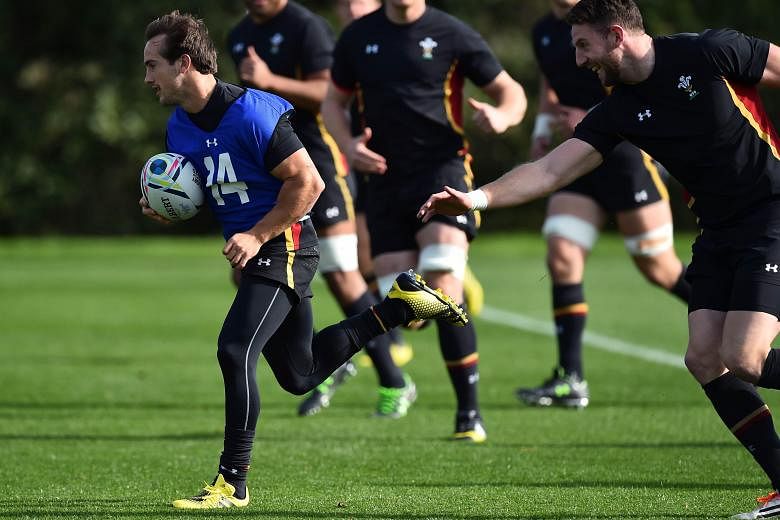With the exception of the taxi driver driving in Marina Bay last week who told me he might be little but he was strong and had been "a mean kicker" for Singapore at sevens and 15-man rugby, I can't imagine too many people here sitting up into the night to watch the Rugby World Cup.
I might be wrong because rugby has its heroes in some unlikely places.
Watching Wales overturn Fiji in front of over 71,500 fans at Cardiff's Millennium Stadium on Thursday was to marvel at the spirit, the slipperiness, the bravery of Matthew Morgan, a young Welshman bursting through the hulking Fijian backs.
Morgan would appeal to you because he stands barely 1.5 metres but his heart is big and his brain is sharp. He represents Wales at this World Cup because torn flesh and snapped ligaments have made his nation dig very deep into reserves they scarcely knew they had to replace big-name casualties.
Rugby can be physically brutal, and sometimes it is the little guys, closer to the ground and harder to nail, who survive the quick turnarounds of tournament play.
It sounds almost as if the Fijian Islands are big in this game?
Well, they have plenty who tower above Morgan and his ilk, and some whose body weight would squash him like a fly - if they could catch him.
And Fijians excel at rugby union almost as much as Welshmen, New Zealanders, Englishmen, Aussies, South Africans or Frenchmen.
To call it a World Cup is perhaps like America proclaiming its World Series Baseball. Rugby is heavily weighted in the old Commonwealth, England by population count is the big beast of it, but invariably the All Blacks, the New Zealanders who live and breath rugger from infancy upwards, prevail.
I have relatives down there whose son, Sam, was in All Black kit before he was seven, and whose younger sister Phoebe does an impressive version of the Haka war dance.
It's in the blood.
Fiji can easily find 15 men from a population of 900,000 to assert on the rugby field the independence those islands finally managed to attain in 1970. Five more years, and Fiji can celebrate like Singapore is doing now.
But even Wales, where once tough rugby warriors came up out of the coal mines, are minnows of three million people compared to England (53 million) or France (65 million).
Here's the essence of this World Cup so far. A week ago, England lost by three points to Wales, and tonight (Sunday morning in Singapore), the English must beat Australia, or else the hosts of this 20-nation event will leave the party almost before it is in full swing.
The marketing men, the bean counters and the nationalists are having apoplexy over that.
England's players, with all the advantages of home rule, and some advantages that seem against the notion of fair play, are now being cast in the media as big heavy lumps heading for a Humpty Dumpty fall.
The psychologists, inside and outside the England camp, talk about the weight of expectation weighing down on these big boys and big men.
The captain, Chris Robshaw, is being pilloried by the critics, some of whom once shared the dressing room with him.
That is the modern way: Players retire, injured or not, and migrate to the press box or the TV studio.
Here, again, the smaller nations get kindlier treatment.
Before Wales kicked off against Fiji, for example, Gareth Thomas, a retired Welsh winger with 100 Test caps in his locker, set the scene on television.
"For any team to come and beat Wales," he said, "you have to break the spirit before you can break the team."
Wales, though, had a built-in handicap. Their victory over England was just five days previously, and that kind of turnaround is very tough on beaten-up bodies. England, for example, are getting eight days between games while poor, little Fiji had to play against England, Australia and Wales in the span of 13 days and nights.
"Fear God and Honour the Queen" is written into the Fijian constitution.
"Hen Wlad Fy Nhadau" - the Welsh anthem sung in Welsh - translates as "Old Land of My Fathers".
And Wales, a part of Britain but separate when it comes to rugby, call on everything and anything to boost the spirit that Thomas spoke about.
Before the Fiji game, Joe Calzaghe, a Welsh world boxing champion, gave the players a private preview of the forthcoming film of his life.
The singer Tom Jones addressed the team.
And Leigh Halfpenny and Rhys Webb, two of the nine Welsh players who were forced out of this tournament through injuries before it began, were invited to hand the match jerseys to those who were fit and available for selection.
All this emotion, this closing of ranks of Welshness was used, or allowed, by Warren Gatland, the former New Zealand All Black who now trains the Welsh.
Gatland can be tough, at times acerbic, but he comes from God's own country so far as rugby union is concerned.
Wales by the way defeated Fiji by 23 points to 13, despite the home side's weariness, and despite what looked to my eyes to be a ludicrous submission to mercenary forces.
Throughout my lifetime, Wales have played in blood red jerseys and styled themselves as the Red Dragons.
On Thursday, against Fijians in white shirts, the Welsh were kitted out in black.
Surely this was not a ploy to dress Gatland's team up in the colours he grew up in?
Nothing of the kind. It was, of course, a contractual agreement between the Welsh Rugby Football Union and its kit manufacturer.
The manufacturer, Under Armour, is American.
Americans are not great at rugby.
The only redress for fans who identify with their players in red is simple - don't buy the offending merchandise.
RUGBY WORLD CUP REPORTS


